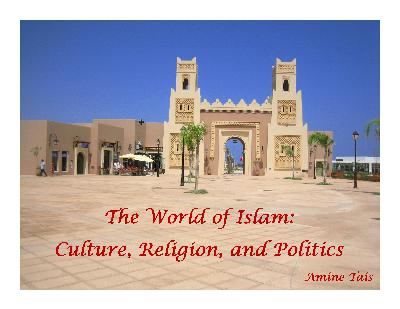Discover The World of Islam: Culture, Religion, and Politics
The World of Islam: Culture, Religion, and Politics

56 Episodes
Reverse
This episode discusses some elements related to the transition from the first dynasty of the world of Islam, the Banu Umayya, to the highly influential ruling dynasty of the Banu al-Abbas, bringing Muhammad's clan of Banu Hashim back to a leadership role.
This episode continues discussing the non-Muslim communities of the early Islamic period. The focus shifts to Christian communities after the Arab conquests.
This episode of the World of Islam briefly discusses the non-Muslim communities of the early Islamic period, particularly after the Arab conquests of the Near East and the establishment of an Islamic empire. The focus of this first part is on Judaism and the Jewish communities.
This episode seeks to correct a major misconception concerning Islam and Muslim life. The Islam of the masses is not simply a reflection of the intellectual discourses that we have covered so far in the podcast.
This episode of the World of Islam introduces the so-called Ikhwan al-Safa (The Brethren of Purity), a group of mysterious thinkers that produced a major encyclopedic philosophical work. We touch on Ismailism and the attempt to unify various forms of knowledge in classical Islam.
A History of Islamic Philosophy by Majid FakhryIslamic Philosophy A-Z by Peter S. GroffIslamic Philosophy: an Introduction by Oliver LeamanThe Cambridge Companion to Arabic Philosophy Edited by P. Adamson/R.C. Taylor
Al-Farabi (d.950) was one of the most important philosophers of the world of early Islam. This episode briefly introduces part of his contribution to metaphysics and political philosophy.
Sources and further readings:A History of Islamic Philosophy by Majid FakhryIslamic Philosophy A-Z by Peter S. GroffIslamic Philosophy: an Introduction by Oliver LeamanThe Cambridge Companion to Arabic Philosophy Edited by P. Adamson/R.C. Taylor
This episode highlights two perspectives in early philosophy within Muslim contexts. Al-Kindi (d. 860s) viewed philosophy and religion as compatible and important whereas al-Razi (d.925) was skeptical of revelation and prophets.
Sources and further readings:
A History of Islamic Philosophy by Majid FakhryIslamic Philosophy A-Z by Peter S. GroffIslamic Philosophy: an Introduction by Oliver LeamanThe Cambridge Companion to Arabic Philosophy Edited by P. Adamson/R.C. Taylor
This episode discusses the interaction with Greek philosophy in the early Islamic period. We encounter Plotinus, Neoplatonism, and the important Christian translators of Greek knowledge to Arabic which opened the door to the rise of major Muslim philosophers in later times.
Sources and further readings:A History of Islamic Philosophy by Majid FakhryIslamic Philosophy A-Z by Peter S. GroffIslamic Philosophy: an Introduction by Oliver Leaman
The Cambridge Companion to Arabic Philosophy Edited by P. Adamson/R.C. Taylor
Today's episode seeks to present a general picture of the Sufi worldview. Some of the questions we briefly deal with include: How do Sufis interpret revelation? And what is the Sufi "Way" or "Path" (tariqa)? We also encounter the terms kashf, haqiqa, maqamat, and ahwal.
This episode discusses a further step in the later rise of full-fledged Sufi orientations within the world of Islam. We encounter the concepts of ma`rifa (intuitive knowledge), fana' (annihilation in God), and baqa' (subsistence), as well as the important figures of Bistami (d.875), al-Junayd (d.910), and al-Hallaj (d.922).
This episode introduces the tradition of Sufism that some also call Islamic mysticism. We are concerned today with the early period and the practice of zuhd (asceticism).
This episode discusses the struggles of modern Muslims to make sense of the concept of Jihad. We consider the impact of European colonialism and attempt to map a number of ways in which Muslims in the modern world have perceived Jihad up to the present.
This episode briefly discusses the worldview of the Jihad movements that appeared on the Muslim scene around the 17th and 18th centuries AD. Can we view these movements as, in some ways, precursors to contemporary Jihad movements? The episode particularly highlights the attitude of these movements towards the religious practice of their time and also their drive to establish a "caliphate."
What exactly is Jihad? This episode discusses the traditional doctrine of Jihad that Muslim Jurists developed and takes a brief look at related issues of conflict, peace, and pluralism in the Qur'an and some premodern Muslim legal discourses.
What does Ijmāʿ (consensus) mean? How does it
function within traditional Islamic Law? In what way do the Sunni concept of “ijmāʿ” and the Shīʿī concept of “imām” parallel each other? What are the
political dynamics of ijmāʿ?
The episode discusses the concept of ijtihad that has been used by Muslim
jurists to derive legal rulings. We particularly focus on what is known as qiyas and that came to be the most
dominant interpretative tool that a mujtahid
utilizes in this process.
The episode introduces some of the different types of Hadith collections that arose in the world of Islam over the centuries. We discuss the role of Hadith in the transition from Qur'anic discourse to Islamic discourses and learn about sahifas, musannafs, musnads, and the Sahih movement.
Hadith reports attributing sayings and actions to Muhammad came to play a major role in the shaping of the religion of Islam. This episode will discuss some of the classifications of Hadith that Muslim scholars came to adopt after the success of what can be termed the Hadith movement.
This
episode deals with the institutionalization of the legal field in Sunni Islam and the rise of the four "orthodox" legal schools or madhabs (Hanafi, Maliki, Shafiʿi, and Hanbali).
This episode further discusses the debate between the Ahl al-Ra'y and Ahl al-Hadith as well as the compromise initiated by al-Shafiʿi, who will make the case for hadith as vehicle for Sunna and will establish a rudimentary base of Usul al-Fiqh (Sources/Principles of Jurisprudence).






